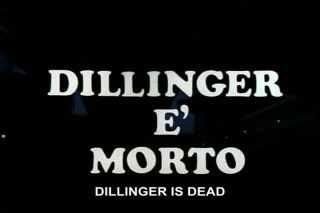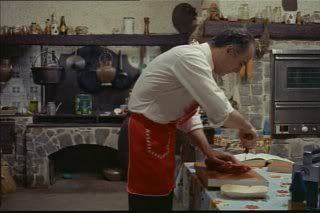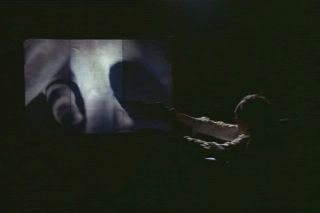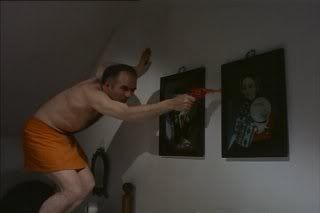
A man in a mask is locked into a chamber. Yellowish, deadly-looking gas fills the confined area, but the man is unharmed. He waves at Glauco (Michel Piccoli), the mask’s designer, who safely observes from outside. Glauco’s associate begins to read to him (and us) an essay he’s written, a piece of social criticism which seems heavily influenced by the Frankfurt School. He explains that the man in the mask is a symbol for modern man, that we are all in a toxic environment. Glauco humours him, but clearly doesn’t take the man seriously. Obviously he should, since the rest of the movie only proves his intrepid co-worker’s point.
Marco Ferreri’s Dillinger is Dead is an odd beast, and one that is difficult to discuss without ruining, since the end of the film is so important to understanding the film’s meaning and its appeal. It is a film about what happens after you’ve accomplished everything you’re supposed to: Glauco has a beautiful wife, an incredible home, and a high-paying job. He (seemingly) wants for nothing. And yet this is profoundly unsatisfying. Glauco is Marcuse’s one-dimensional man.

So what comes next? Once you’ve gotten everything that a capitalist society tells those in the middle class they want and need, you are faced with two options. You can stop moving, being happy with what you have. This can lead to stasis, and perhaps even rot. Or you can try to keep moving. But what do you move towards? Nothing prepares you for that next step.
Following the discussion with his co-worker in the opening scenes, Glauco returns home to his beautiful wife, who needs pills to sleep and goes to bed in full makeup. Glauco is less than enthused by the food that she’s left him, so he decides to cook his own meal. While searching for a cookbook with his favourite recipe, he comes across an old pistol. It’s rusted and practically useless. While Glauco cooks his meal he fiddles with the gun, taking it apart and bathing it in olive oil. He barely speaks.

Watching Glauco cook is a real joy. Perhaps I just like food too much, but there’s got to be a reason that those cooking shows do so well that there are two or more channels dedicated to them alone, and that’s the fact that watching people cook is somehow rather enticing. Glauco knows his way around the kitchen, and it shows. And while he cooks he toys with the gun, playing with it like a child with a toy. Soon he discovers an old newspaper, proclaiming that the famous American gangster, John Dillinger, is dead.
The movie progresses like this from one scene to another. Glauco is bored, and decides to explore his home, watching old movies and doing things that bored people tend to do while they're alone, things which are often ridiculous or embarrassing but always authentic. Glauco’s house is a marvel, filled to the rafters with odds and ends. It looks thoroughly and completely lived in, nothing like a movie set at all. With almost no dialogue, the viewer watches as the Italian man interacts with his 8mm home movies, listlessly eats what he can, and flirts with his live-in maid. It’s a real testament to the writing and the actor that you can sit through 80 minutes of what is essentially a guy puttering around his house.

And yet, no matter how light-hearted Glauco’s actions are, no matter how mundane the film seems, there’s always a sense of dread, established in the opening shots by the gas mask and carried through the rest of the film by the presence of the gun. Glauco is constantly fiddling with the gun while he goes through all the other motions. He cleans, reassembles it, and even paints it red, with white polka dots. He finds some old bullets and loads it. Having spent so much time on it, it’s only logical that the gun be used. Even if Glauco doesn’t know it, the viewer does.
Dillinger is Dead is a remarkable film. It’s rumoured for a Criterion Collection release, either this year or next, and I’d encourage people to give it a look. It certainly isn’t going to be everyone’s cup of tea, but there’s something incredibly engaging about the art behind it--the set design, the cinematography, and most importantly the huge performance by Michel Piccoli, one whose shoulders the success of the entire film rests.










2 comments:
Sounds like a really fascinating movie and one that, i'm sad to admit, I haven't heard of previously. It certainly sounds interesting, and the premise is something that seems easily applicable to the general ennui of today. Really hope that Criterion edition comes about.
I hadn't heard of it either, until Criterion announced that they were touring with a print of the film, so I think a DVD is an inevitability. If you don't want to spoil the film, avoid the wikipedia entry. If you DO want to spoil the film, it has a few good interpretations.
I'm intrigued by the sound of one of Ferreri's other films, "Bye Bye Monkey." It's about Gerard Depardieu finding the corpse of King Kong on a beach, and deciding to raise Kong's orphaned son with a friend. It's probably terrible, but the description sounds great.
Post a Comment